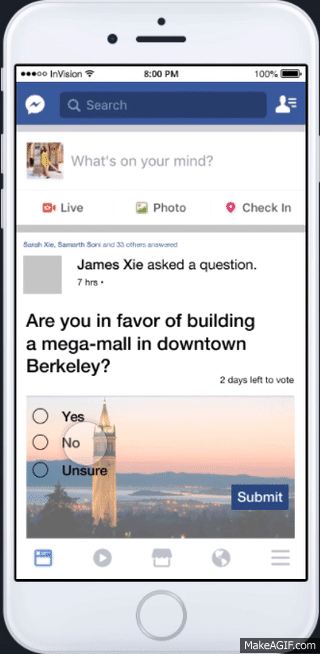SamPollGetting U.S. Citizens Off The Sidelines
How might we help people on Facebook in the U.S. become involved in the political process? This was one of two challenges laid out before a group of Northwestern Engineering and Medill undergraduate students participating in the Bay Area Immersion Program during the 2017 winter quarter.
The task was outlined by corporate partner Andrew Prince, an alumnus from the Engineering Design Innovation program at Northwestern and a content strategist at Instagram (owned by Facebook). Dr. Liz Gerber, associate professor of mechanical engineering, design and communication at Northwestern, guided students through the process.
Focusing on human-centered design principles, the students explored and researched ideas for about a week. They came back together to form six teams that each concentrated on a more focused problem gleaned from the insights they discovered. This is one of those efforts.
THE PROBLEM
A stumbling block to political involvement is the lack of an easy, direct channel of communication between constituents and elected representatives, the students realized. Letters are slow. Telephones aren’t practical when one official represents tens of thousands of citizens. Neither makes the constituent feel like she has had an impact.
"These are questions that Facebook was actively thinking about right at the same time," said Gerber. "In a very short period of time, the students were able to dive into a meaningful space and provide value to a company that has thousands of people working on this."
SOLUTION
 The team envisioned SamPoll, a robust Facebook feature that would create a convenient line of communication between an elected representative and her constituents. SamPoll would let an official create instant polls on a variety of issues, receiving individual comments and aggregate results from just her district. For their part, constituents would learn what their representative was interested in, have a chance to weigh in and, after answering the poll, get the added payoff of seeing how their neighbors felt about the issue.
The team envisioned SamPoll, a robust Facebook feature that would create a convenient line of communication between an elected representative and her constituents. SamPoll would let an official create instant polls on a variety of issues, receiving individual comments and aggregate results from just her district. For their part, constituents would learn what their representative was interested in, have a chance to weigh in and, after answering the poll, get the added payoff of seeing how their neighbors felt about the issue.
THE PROCESS
In researching the original challenge, the students considered a number of options before settling on SamPoll.
One idea centered on creating tools to help campaign organizers. The students interviewed protesters, who despite their clear activism, said they didn’t feel they were making a real impact. They found that the barrier to political involvement was convenience.
“Instead of pushing people to be more active, we decided to lower the barriers to being active and make politics more convenient," said James Xie, a sophomore studying computer science at Northwestern Engineering.
The team attended local city council meetings and interviewed elected officials, who said they often had ideas or wanted to make changes but didn’t really know how the residents felt about it.
The team narrowed the broader idea into a tool, SamPoll, aimed at addressing the root issue they identified through the design process: lack of a direct channel of communication between elected officials and their constituents.
"We were looking at incentivizing both parties to increase the flow of communications between representatives and constituents," explained Xie.
STATUS UPDATE
The spring 2017 quarter team now is considering how to make SamPoll work on its own platform, generating more user engagement and more direct communication.
"The end goal from my standpoint is to learn about the design process. That’s the No. 1 goal. The second goal is to impact peoples lives in some way," explained Gerber. "That could be by working with a community partner, who would get an idea for how to run their service differently. Already we have influenced Facebook, who are taking some of these ideas back to their organization to see how it would inform their current delivery."
TeamJake Bortz, Florence Fu, Tristan Litré, Kaley Wendorf, James Xie
Faculty AdvisersDr. Liz Gerber, Anthony Jakubiak (EDI alumnus and senior interaction designer at SAP)
